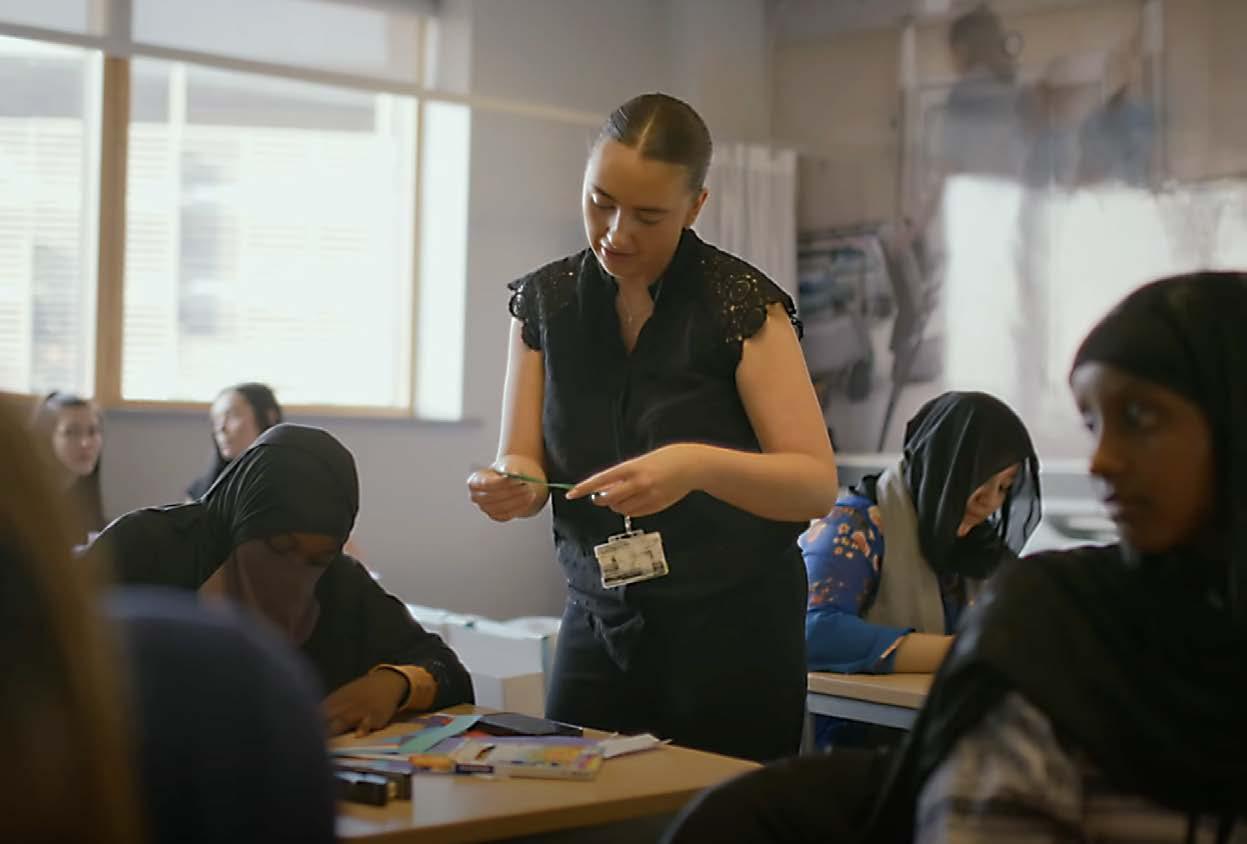


At Bolton College we expect you to be:




At Bolton College we expect you to be:

We expect all students and staff to be:
• READY – Prepared, punctual, and engaged.
• RESPECTFUL – Kind, polite, and thoughtful.
• SAFE – Acting in ways that protect physical and emotional wellbeing.
These three expectations are embedded into everyday conversations, classrooms, and routines and set you up to be:
WORK READY • WORLD READY • FUTURE READY

What does this mean in practice?
• Attend all of your programme, including English, maths and tutorials
• Arrive on time and prepared with the right equipment
• Engage with the learning
• Show respect to others by not swearing
• Wear your ID card at all times and show it when asked
• Clear up after yourself and put your litter in the correct bin
• Use your mobile device in class for learning only as directed by staff
• Wear the right clothing, especially in workshop areas
• If you have to smoke, do so off-site away from the College buildings and the nursery
• Eat in places designated for eating and not on the floor
• Be helpful and tolerant to each other
• Make sure you protect yourself on-line
• Tell us if you are having problems or see someone else in difficulty



The college wants to promote a positive learning environment where poor discipline is challenged and positive engagement is rewarded and celebrated.
If you are 16-18 years old or have an Education Health & Care Plan (EHCP) your parents/carers are encouraged to be involved in all stages of this process.
Positive engagement will be celebrated in many ways, including
• verbal praise and positive conversations, recording on your electronic records (Pro-Portal or Aptem) or through postcards, badges and certificates
• You will be given opportunities for rewards, throughout the college year, for example if your attendance is good. The rewards may include vouchers, entries to prize draws or further enrichment opportunities
• We hold celebratory events
• You may be nominated for a local or national award
• We work with employers to provide good opportunities for students who engage well. Positive engagement leads to a better reference
• Delivers engaging lessons with high expectations and clear structure
• Uses consistent, calm language to reinforce expectations
• Builds trusting, respectful relationships with students
• Recognises effort, celebrate progress, and role-model self-regulation
• Helps you set targets
• Tracks your progress
• Meets regularly with you, - either in your group or individually
• Checks your attendance and punctuality
• Next of kin is involved from early stages for students under 18 or with an EHCP
• We value the contribution of families and encourage partnership in supporting behaviour
• Employers or referring schools will be informed when appropriate
• Keeps in contact with your parents (16-18 or EHCP)
• Puts you in touch with others who will help you should you need it
Repeated absence, lateness and disrupting lessons are examples of poor discipline and will be managed in the following way:
• Your teacher / WBT will meet with you to draw up Positive Engagement Interventions and Targets (PEIT)
• The PEITs are an aid to get you back on track
• The PEIT states clear improvement targets and the interventions outline strategies to achieve the targets
During the review you will:
• Discuss the improvements you have made and how you have engaged with the intervention strategies
• Be expected to have achieved your targets
• Be set further targets, with revised intervention strategies, if more improvement is needed



This is a formal process for serious or repeated misconduct (eg. where PEITs do not lead to improvement). Stage 1 - Head of Department or Student Experience Managers
The main purpose of stage one is to make sure you understand the consequences of continuing with poor discipline. Managers will meet with you (and your parents/carers and employers if relevant) to discuss the improvements we expect. There may be one or more disciplinary meetings.
The outcome of these is usually a written warning and the possibility of sanctions. Further interventions and targets (PEITs) will be monitored by the issuing manager.

For very serious offences:
• Requires a formal disciplinary meeting within six working days.
• The meeting is chaired by an Assistant Principal
• Where practicable, the member of staff who has experienced your misconduct will also be there.
• You can be accompanied by a parent/ carer or friend
• Your misconduct and the impact on others will be fully discussed.
• Commitment to learning and any previous record will be taken into account.
• The meeting could lead to a ‘Final Written Warning’ or a recommendation for exclusion.
• You would normally be informed of the outcome in writing within six working days
A copy is kept on your file and college records until the end of the course. Parents/carers and employers, if relevant, can access these via Pro-Portal or Aptem.
A further PEIT is set up as well as a restorative, re-integration meeting.
There may also be sanctions as appropriate to the misconduct. Re-integration meeting
The re-integration meeting is a short meeting which gives you, and the person most impacted by your behaviour, an opportunity to talk to each other.
A final decision will be made by the Vice Principal.
The decision will be communicated to you in writing within 20 working days and will include the details of the exclusion e.g. how long you are excluded for.
The letter will also give you details of the right to appeal and how to get support through the process.
or senior member of staff
For serious misconduct, where a ‘cooling off’ period is required or you are unfit to study, you may be temporarily suspended from the college. Suspensions will be kept as short as possible. You will be told how long the suspension is for and this will be confirmed in writing if the suspension is for longer than a day.
Support during suspension will be arranged through your Head of Department.
If you have any safeguarding concerns please email: safeguarding@boltoncc.ac.uk
All information is correct at time of print. If you need this guide in any other format, please get in touch.
Only Heads of Department, Student Experience managers or senior managers may authorise suspensions.
A learner may be immediately excluded if they refuse to adhere and fail to comply with health and safety demands, safeguarding requirements and refusal to wear a College ID badge.
A student may be suspended and receive an automatic Stage 2 Warning if they commit a serious breach of the College’s ‘Ready, Respect, Safe’ expectations. Examples of such incidents may include:
• cases of bullying or harassment including cyber-bullying or inappropriate use of social media
• fighting
• verbal abuse towards another student or member of staff
• conduct which could threaten the health and safety of others
• violent, dangerous or intimidating conduct-including possession of a weapon or imitation weapon
• conduct which could threaten the health and safety of others
• sexual, racial or other harassment of another student or member of staff
• abusive behaviour towards another student or member of staff (including making or sharing malicious comments about another student)
• theft or unauthorised possession of any property or facilities belonging to a student, the college, or any employee of the college
• damage deliberately carried out on college property
• allowing a non-member of the college on campus using their own membership card
• possession of, consumption of, dealing in or incapability due to illegal drugs, alcohol or legal highs
• commission of a criminal offence, whilst a student, which may adversely affect the college’s reputation
• failure to respond to the targets set in a Stage 2 Warning
• an extended period of poor attendance, where absence is not notified or reasonably explained
• failure to complete essential work that would result in a student failing their course or programme of study, without reasonable explanation
Students have 10 working days to appeal disciplinary decisions:
- Appeal to Assistant Principal Stage 2 Warning
- Appeal to Vice Principal Exclusion Decision
- Appeal to Chief Education and Experience Officer
Appeals must be made in writing to Quality@boltoncc.ac.uk . If you need support with this, please contact the Student Experience Zone at the Deane Road campus.
Appeals should be made against at least one of the following criteria:
- procedural fairness
- new evidence
- disproportionate sanction (decision)
At Bolton College, we believe:
• People grow in connection, not isolation
• Respect, kindness, and consistency are more powerful than control
• Every student has the potential to reflect, recover, and succeed











